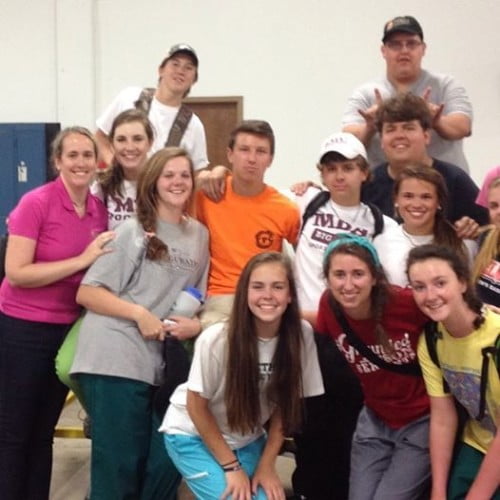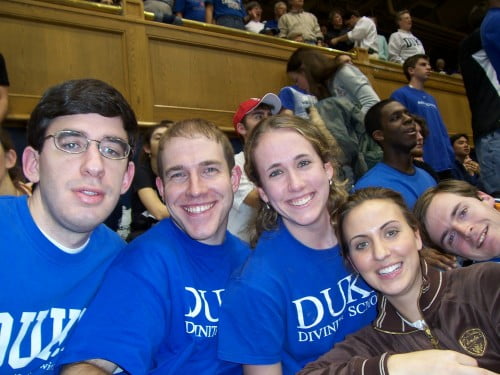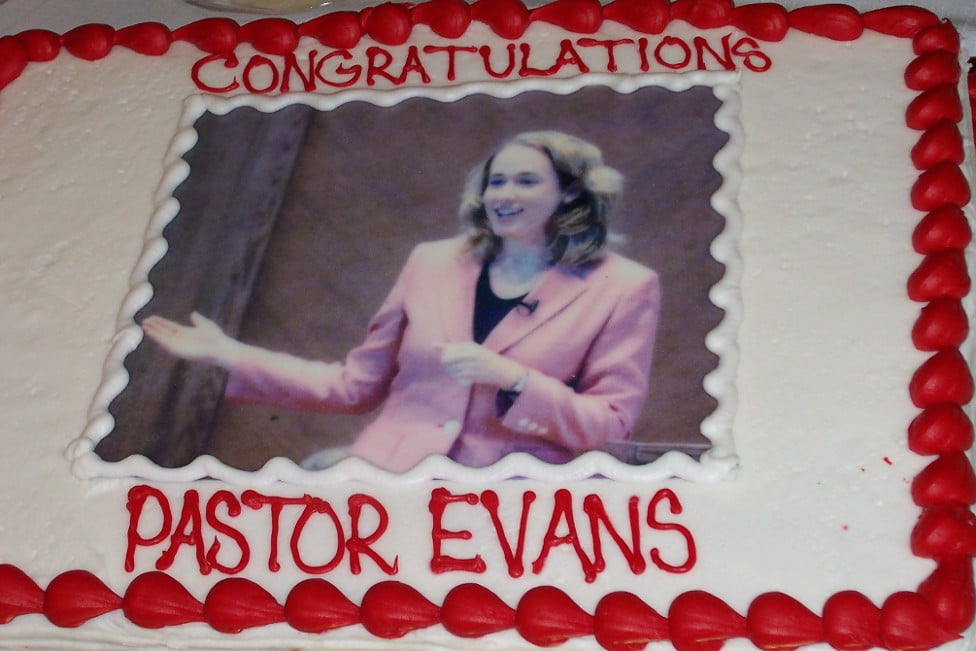 Two weeks ago, I assisted a youth group for the week packing food boxes at Feed the Children's volunteer headquarter in Oklahoma City.
Two weeks ago, I assisted a youth group for the week packing food boxes at Feed the Children's volunteer headquarter in Oklahoma City.
During the early morning introductions, I told them that I was an ordained pastor. I told them that my husband worked at Feed the Children. I told them that I'd been volunteering with the organization for the past year and half. Later on one of the youth came up to me to ask another question.
It was the most typical Christian get-to-know you question that I couldn't believe took all day to surface.
"What kind are you?" (Which short for: denomination are you?) he wanted to know.
There's an answer to give, of course.
"I'm Baptist" I told him.
My ordination came through the American Baptist Churches USA in 2006. I pastored two churches, both Baptist. One affiliated with the American Baptists mostly, the other with the Alliance of Baptists, mostly. I grew up in a Southern Baptist Church. I went to seminary from support of the Cooperative Baptists. (Baptists have a lot of flavors, you know)
So, from the basic bones of my resume, I am Baptist through and through.
But to have the label "Baptist" as the one identifier stuck to my name made me feel uncomfortable when I answered this youth's question. I am more than this label, as is the nature of any label, really.
Of course, if I had to pick a church that my ideas about church polity and practice most closely align with it would be the Baptist tradition. This was a decision I made in seminary and still know I made the right choice for me.
I love the historic Baptist principles of separation of church and state. I believe in local church autonomy and believer's baptism. I am too much of a free spirit to fit in all the check boxes of a denomination with bishops, overseers and not getting a say in where I live and work.
But, my story has always been about engaging those who are different from me and being ok with being the "different one" in the group.
When I was in high school, my parents sent me to Christian School that was filled with kids mostly from Presbyterian (PCA) homes in Lookout Mountain, TN.
I got a scholarship to attend Samford University for college, a Baptist school in Birmingham, AL. While there I spent two summers on a camp staff-- one mostly Baptist, the other mostly Presbyterian.
I attended seminary at Duke Divinity School made up and funded mostly by United Methodists. During my 3 years of study, I pastored two United Methodist Churches in NC as their student associate. I had a lot of Anglican friends.
When I came to DC and settled into post-ordination life, I joined a clergy group that met at a Catholic church. One of my favorite clergy peeps was a Unitarian-Universalist. I even got to pray the opening ecumenical prayer at on the floor of the US Senate one day. 
Since leaving full-time pastoral life, I have joined Martin Luther King Jr. Christian Church in Reston, VA for when we're in DC-- a traditional African-American church. When we're in Oklahoma, you'll find us either at a Native American mission in Watonga or a United Church of Christ (UCC) congregation in Oklahoma City.
I do a lot of supply preaching currently in Presbyterian (USA) congregations now and I'm thinking of going back to get my Doctorate of Ministry at some point in the near future at a Presbyterian (USA) seminary but rooming with my United Methodist pastor friend.
Any ordination council or church ruling body would say I've lost my core. I am confused. Do I really know what kind am I? Why not be loyal? Why not spend more time going to Baptist conventions and conferences for networking?
I can't. I just can't be.
Because while denominations matter-- I guess-- in the end, for me personally it doesn't matter that much. I can't imagine my faith lived out in a Baptist (or only one other) context. Theologically:
 And it's ok. And I know I am not the only pastor who feels this way.
And it's ok. And I know I am not the only pastor who feels this way.
For any of you readers out there who are "denominationally confused" I want to say that I am with you.
Our life and our values change over time. Churches and their values (even with the same name on the front door) change when you live in Alabama, Maryland or Oklahoma. I think it is safe to say that you don't have to be "one thing" your whole life through. The Christian life is about loving Jesus. You can do this in many different particular homes.
I most want to offer is that an ecumenical life is possible. And I am glad to be living it.
On Monday, November 4th, I celebrated the 7th anniversary of my ordination.
Seven years ago this week, I stood at the front of a church-- Calvary Baptist Church in Washington DC and said to the congregation gathered of family, friends and congregation members that I would serve God in my vocational pursuits. I said I would set aside personal interests for the sake of the community of Christ. I said I would seek to embody, teach and share the gospel with my life. I said I would do all of this for as long as I lived.
 After the service, we gathered in the church social hall and ate sausage balls and cheese dip among my other favorite snacks made by my future mother-in-law. There was a cake with a picture of me preaching with a huge, "Congratulations, Pastor Evans!" on it.
After the service, we gathered in the church social hall and ate sausage balls and cheese dip among my other favorite snacks made by my future mother-in-law. There was a cake with a picture of me preaching with a huge, "Congratulations, Pastor Evans!" on it.
A big day all around.
The night before the service, I sat upright the in bed lounging with my closest girlfriends who came into town for the celebration (Baptist ordained pastors as well) trying not to be so anxious.
Over a bag of chips on top of the brand new white comforter I finally had the money to buy in my first post-seminary job, I recounted to them my deepest fear about the hours to come.
It wasn't about the music going awry.
It wasn't about the having to kneel for so long at the front of the church without my legs falling asleep as people prayed prayers of blessing over me.
It wasn't whether or not I'd be able to pray the benediction as I'd planned to say without being too emotional.
No, it was a cry of: "I don't want my life to be over."
I was having pre-ordination jitters; the kind where I really knew that this moment in my life was a really big deal.
And even as my pastoral support girlfriend team sought to calm me down saying that my life wasn't really over. They said things like, "You'll still have fun. . . We'll make sure of that. Being ordained doesn't make you any less human." There was part of me that felt the weight of the shift.
It was like I was getting married to God. I had one last night of freedom.
I ate more chips.
And though I had done everything I could to finally make it to this day-- the improbable feet as a Baptist woman in ministry getting a Reverend in front of her name-- when I stood in front of the altar on November 4, 2006, the relationship of God and I being in an more intense partnership was never exactly what I envisioned it to be.
This would be no easy marriage.
Though I'd grown up with a pastor for a father and knew all the social expectations that came with the title, to be the Rev myself was entirely new. Because all of the sudden the expectations didn't just come with my family name but it was what I'd chosen.
I'd chosen to be the one who would be asked to publicly pray more than the norm.
I'd chosen to be the one who would be asked to stand the gravesides of the grieving, the bedsides of the sick and on the doorsteps of the bewildered seekers.
I'd chosen to be "on call" 24-7 when pastoral emergencies arose in a congregation.
I'd chosen that when the day came that I was legally married to a man that he'd be the kind of man that also supported the marriage I'd been pursuing long before we'd ever met.
But as is with most marriages, as it was with my ordination, it was not a one-sided deal.
God long before had chosen me.
Not that I was more special or "called" than others with different kinds of work, but that this was my path to walk with God.
And in many ways my "fear" was indeed right on-- my life as it was before 11/4/06 was over.
In this new relationship that God and I would share together, greater discipline and sensitivity to the Spirit would be required.
No longer could I ever assume that my faith was for my own edification alone, but was for the blessing of my community.
No longer could I act as though I didn't need community, for as much as they needed me, I needed them.
No long could I live in such a way that forgot the day that God and I got married-- for if their ever came a time when I felt like a new vocational path was given to me-- I'd need to release this marriage in a public way just as it was given to me.
Being married is a long-term commitment.
Seven years ago it all began. Together God and I are still on this journey.
Stay tuned for part 2 of this series coming soon . . . Seven years later.